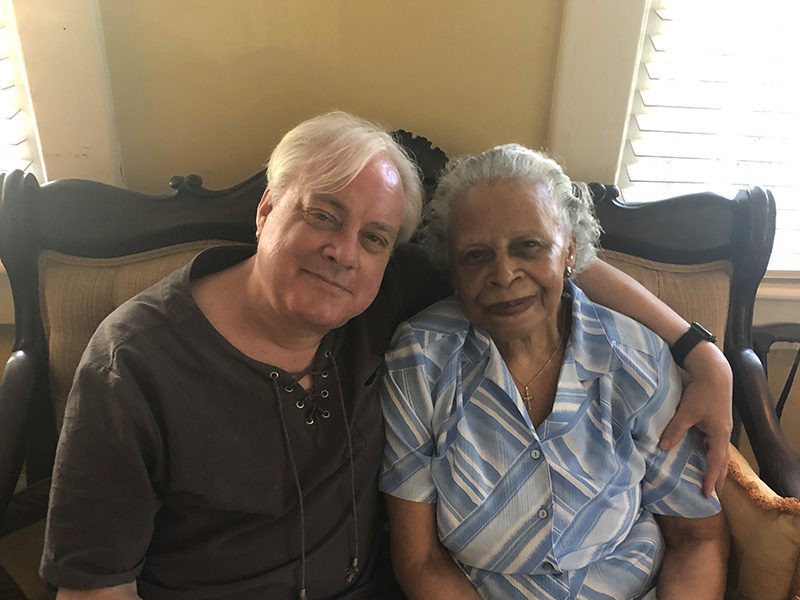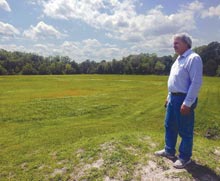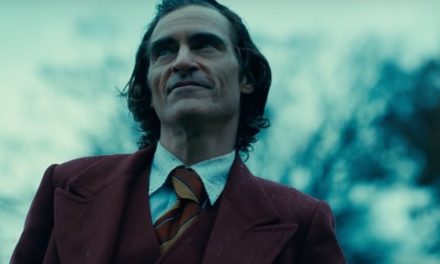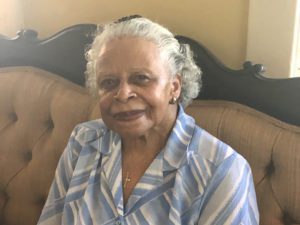
Lucille Davis Culberson
When Erich Wilms invited me to his house to meet his dear friend Lucille Culberson, telling me she had “quite a story,” he wasn’t kidding.
Born in Beaufort in 1925, Lucille lived through the Great Depression, the Second World War, Jim Crow, the Civil Rights Movement… and that was just the first half of her life. Here in her hometown, she’s seen the gentrification of the Old Point neighborhood where she was born, cared for some of its most prominent residents, worshipped at one of its oldest, most significant churches, and witnessed Beaufort’s slow transformation from sleepy little backwater into celebrated tourist destination.
Lucille’s life and times would make a fascinating memoir, and if she ever writes it, perhaps the most unusual chapter will be the one about her unlikely friendship with Erich Wilms.
Sitting together in the parlor of his part-time home/”family retreat” on Prince Street, Erich and Lucille reflect on that decade-long friendship that started at First African Baptist Church, where Lucille grew up and is, to this day, a faithful member. You might even call her its matriarch.
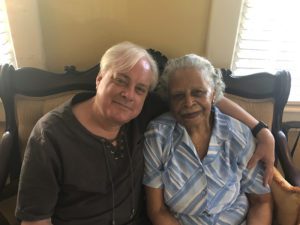
Erich Wilms & Lucille Culberson in the parlor of the ‘Washington House’
“The church is right down the street from my house,” says Erich. “I had been listening to the music and sermons from my veranda for a long time, and one day, I decided to just walk in. I sat down next to GG, and she gave me a big kiss on the lips.”
(GG is Erich’s nickname for Lucille. It stands for Great Granny. She is a great granny, but not his.)
Lucille remembers it differently. “I had seen you at choir practice a few times before that,” she recalls. “You came in while we were singing and sat down in one of the pews. And that big kiss I gave you? That was outside, after church, not during.” Then she laughs, eyes twinkling. “I am a big kisser, though.”
Details. After a decade, they’re bound to be a little vague. But both Erich and Lucille agree that this “big kiss” was the beginning of a beautiful friendship.
Today, Erich Wilms is an official member of First African Baptist – perhaps its only white member – and he sings in the choir with Lucille whenever he’s in town. But aside from this past year, when Covid 19 changed everything, that’s rarely the case. A former dotcom developer who now works at a global level on environmental sustainability, Erich has another home in Hawaii, but spends most of his time traveling the world, “creating companies for humanity.”
And for the past ten years, one of the few constants in his life has been Lucille Culberson.
At first glance, they seem an odd pair. She’s 96; he’s 56. She’s a Black woman who rarely travels beyond her small hometown in the South; he’s a white man who can only be described as a citizen of the world. Superficially, they have little in common. But spend five minutes with them, and you’ll see a connection as genuine and profound as it is improbable. They amuse each other, delight each other, confide in each other, and encourage each other. They are, quite simply, best friends.
“Wherever I am in the world, I always call GG,” says Erich. “Every single day. And we talk for an hour at a time. About everything. I know everything about her, and she knows everything about me.”
For instance, Lucille knows Erich always takes tea at 4 pm, no matter where he is in the world. And she can tell you all about his various environmental initiatives: bee pollination in France; bamboo sustainability in Asia; plastic waste in Singapore . . .
“She also knows the details of my personal life,” Erich says. “She’s my sounding board of wisdom and logic.”
And he knows all about Lucille’s life here in Beaufort. In an interesting twist, she was born in the house right behind his, back when the Old Point was inhabited by a great number of Black families. A couple of years later – when it was beginning to be too expensive – Lucille’s father moved their family across town to a farm on the water, where he became the manager.
Lucille describes her childhood in almost idyllic terms, remarkable considering she grew up during the Great Depression and Jim Crow.
“We had such fun on that farm!” she says. “And we had everything we needed. Fresh milk… Vegetables… Good fishing… And we children thought it was all ours! I didn’t learn till much later that Daddy was just managing the farm for another family. But they were always very good to us. Very kind.”
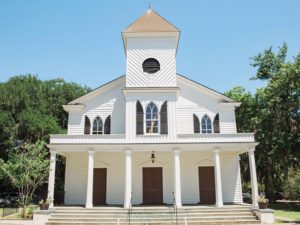
First African Baptist Church in downtown Beaufort
One of 11 children – she’s number seven – Lucille’s young life in Beaufort was full of adventure and companionship. But it wasn’t easy. She remembers walking three miles to school every day – and three miles back – and that she and her siblings weren’t allowed to sit at the drug store counter on Bay Street, or on the main floor of the Breeze Theater. “We Black kids had to sit in the balcony,” she recalls. “And there were separate water fountains.”
Her mother – the one raising 11 children – took in wash and helped on the farm. “But she always served us three hot meals a day,” says Lucille, smiling at the memory. If she harbors any bitterness about growing up Black in Beaufort, there is no trace of it in her words, nor on her beautiful, astonishingly unlined face.
Five of her siblings served in the military during World War II. As for Lucille, she married after high school, started a family, and trained as a nurse and midwife. She delivered a few babies before Beaufort Memorial Hospital opened in 1944, but spent most of her career – over 50 years – caring for elderly and homebound patients, many of them in the Old Point where she was born all those years ago.
Sometime in the early 2000s, Erich Wilms and his brother bought their house in the Old Point – on Prince, near Lucille ‘s first home. They call it the “Washington House,” for its original owners, a Black family, and think of themselves as its stewards. Built near the turn of the 20th century, or earlier (records conflict), the home stayed in the Washington family for about sixty years, and Lucille Culberson remembers attending meetings of the First African Baptist Mission Society in its parlor. The same parlor where she now sits with her good friend Erich Wilms and this journalist.
And so we circle back to First African Baptist, the center of Lucille’s long life. The church was built in 1865 by freed slaves, and Lucille came along sixty years later. The minister at the time was her godfather; it was he who named her Lucille – which, incidentally, means “light.” Today, almost a century later, her extended family fills two pews.
“You can’t imagine everything she does for this church,” Erich tells me. “From washing the windows to stepping in and singing a solo when nobody else showed up for choir . . . ”
Try getting Lucille to elaborate on her plentiful acts of service – both at church and in the community – and this otherwise chatty woman clams up. (Such modesty was once widely understood to be the Christian way.) “I just pray to God and do the Lord’s will,” is about all she’ll say.
No doubt she was doing the Lord’s will when she marched with Martin Luther King, Jr, in Beaufort during the Civil Rights Movement. “We marched from the old K-Mart Shopping Center down to Grace AME Church,” she remembers. Her brother Hyland was involved in the movement and knew Dr. King well, but he’s been gone for a long time now.
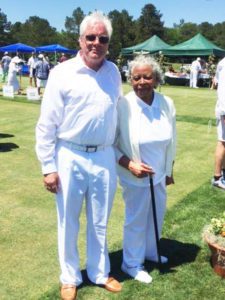
Erich & Lucille at the AMIkids Charity Croquet Tournament
In fact, Lucille is the last surviving member of her birth family. She’s lost her parents, all 10 of her siblings, her husband, and two of her three children. But she’s remarkably healthy, her spirits are high, and she radiates that serenity best described in Philippians as “the peace that passes all understanding.”
I don’t know why the Lord is keeping me here,” she says, “but I always keep Him first and trust in Him.”
Witnessing their mutual attachment, it occurs to me that the Lord might be keeping her here for Erich Wilms. I’m not sure what he’d do without those daily phone calls.
“I took GG to the AMIkids charity croquet tournament a few years ago, and we had so much fun,” he says. “We were all dressed up in our whites with all these fancy people. But all GG wanted to know was ‘Did we raise any money for the cause?’ She just wants to help people. That’s what she does.”
Given our current national conversation, I can’t help addressing the elephant in the room. I ask Erich and Lucille if race has ever been an issue in their relationship. They both seem amused by the question.
“Well, some people did look at us kind of funny at the croquet tournament,” Lucille laughs. “But I think that was mainly because of our age difference.”
“The funny thing about true love – it’s just that,” says Erich. “We don’t care about black/white, age, or any such matters. Life is life.” Lucille agrees.
If only we could bottle that wisdom and ship it all over the country.
Before I leave, I can’t help asking the radiant 96-year-old in the room to share the secret of her long, happy life. Could it really be as simple as good genes and a positive attitude?
“My daddy taught me two things,” she answers, beaming her luminous smile. “Always go to church. And always vote.”
Smart man, her daddy.

